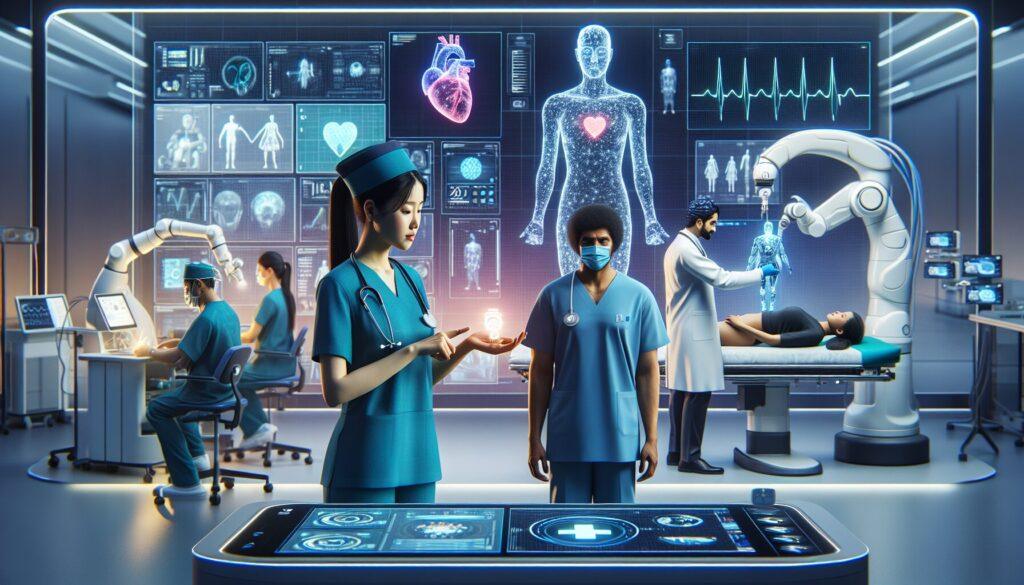AI in Healthcare
The integration of AI in healthcare has revolutionized the way medical professionals approach patient care, allowing for a level of personalization previously unattainable. Through the analysis of vast datasets, AI algorithms can identify patterns and predict outcomes tailored to individual patients.
This enables doctors to make more informed decisions, offering treatments and preventive measures that are specifically designed to align with each patient’s unique genetic makeup, lifestyle, and medical history. As a result, healthcare is becoming more proactive and patient-centric, significantly improving the quality of care and patient satisfaction.
AI in healthcare is reshaping industries throughout the globe; however, maybe nowhere is its influence more profound than in medicine. AI’s capability to research huge quantities of information and determine patterns can result in earlier diagnoses, personalized therapy plans, and improved affected person outcomes.
This article explores the transformative function of AI in healthcare via a collection of insightful questions and solutions, providing a deep dive into its present functions and future potential.

Q&A on AI in Healthcare
Q1: What are some present functions of AI in healthcare?
A1: AI is currently being utilized in various aspects of healthcare to improve patient outcomes and streamline processes. For instance, machine learning algorithms are being used to analyze vast datasets from electronic health records to predict patient risks and outcomes more accurately.
AI-driven diagnostic tools are aiding radiologists in detecting anomalies in imaging scans with greater precision, while natural language processing is being employed to extract meaningful information from unstructured clinical notes.
Moreover, AI-powered virtual assistants are providing support for routine tasks, such as scheduling appointments and answering patient queries, thereby allowing healthcare professionals to focus more on direct patient care. AI is at present being utilized in numerous facets of healthcare, together with:
1: Diagnosis and Treatment Recommendations: AI-driven diagnostic tools are revolutionizing the way diseases are identified, offering a level of precision that was previously unattainable. By analyzing vast datasets, these tools can detect patterns and anomalies that might elude even the most experienced practitioners.
Furthermore, AI systems are being integrated into treatment protocols, providing personalized recommendations that take into account individual patient histories, genetic information, and even lifestyle factors, ensuring that each patient receives the most effective and tailored care possible.
AI algorithms can analyze medical information to help in diagnosing situations extra precisely and swiftly. On occasion, AI programs are utilized in radiology to detect abnormalities in X-rays and MRIs that are perhaps missed by the human eye.
2: Patient Monitoring and Care: Wearable AI personalization extends into the realm of patient monitoring and care, where wearable technology equipped with AI capabilities is revolutionizing healthcare.
These devices continuously gather health data, such as heart rate, activity levels, and sleep patterns, allowing for real-time analysis and personalized healthcare recommendations.
By leveraging AI, healthcare providers can offer more proactive and preventative care, intervening before a condition worsens and ensuring patients receive the most tailored and timely treatments possible.
Gadgets and AI-powered apps are more and more used for steady monitoring of sufferers, amassing information that may predict well-being points earlier than they develop into important.
3: Drug Development: AI’s role in drug development is revolutionizing the pharmaceutical industry. By analyzing vast datasets of chemical compounds and biological information, AI algorithms can identify potential new drugs much faster than traditional methods.
This not only accelerates the discovery process but also increases the accuracy of targeting specific diseases, potentially reducing the time and cost associated with bringing new medications to market.
With AI’s predictive capabilities, it is possible to foresee how different drugs will interact with various genetic markers, paving the way for more personalized medicine and treatment plans. AI accelerates the drug discovery course by simulating human responses to medicine and figuring out potential candidates for medical trials.
| AI Application | Description |
|---|---|
| Diagnosis Assistance | Analyzes medical pictures and information for correct diagnoses |
| Patient Monitoring | Uses wearables for real-time well being monitoring |
| Drug Discovery | Simulates responses to speed up discovery processes |

Q2: How does AI enhance affected person outcomes?
A1: AI enhances patient outcomes by providing tailored treatment plans based on individual patient data, leading to more accurate and effective care. By sifting through vast amounts of medical records and literature, AI can identify patterns and treatment options that might not be evident to human practitioners.
Furthermore, AI-driven predictive analytics can forecast potential health risks, enabling preventative measures to be taken before conditions worsen, thereby improving the overall quality of patient care. AI enhances affected person outcomes by offering:
1: Personalized Medicine: Tailored Treatment Plans: By analyzing vast datasets, AI algorithms can identify patterns and correlations that might go unnoticed by human healthcare providers. This capability allows for the creation of highly individualized treatment plans that consider a patient’s unique genetic makeup, lifestyle, and environmental factors.
As a result, patients receive treatments that are optimized for their specific needs, potentially leading to faster recovery times and reduced side effects.AItailors therapy plans primarily based on a particular person’s genetic data and lifestyle, guaranteeing more practical and focused therapies.
2: Predictive Analytics: Predictive analytics leverages AI to analyze vast amounts of data and identify patterns that can forecast future outcomes with impressive accuracy. This approach is particularly transformative in personalizing customer experiences, as it enables businesses to anticipate individual preferences and behaviors.
By harnessing predictive analytics, companies can craft highly targeted marketing campaigns, recommend products or services that align with consumer desires, and enhance overall engagement by staying one step ahead of their customers’ needs. AI fashions predict affected person deterioration by analyzing historic information, enabling proactive interventions.
3: Operational Efficiency: Enhanced Customer Service: AI-driven personalization extends into the realm of customer service, where chatbots and virtual assistants provide immediate, tailored support 24/7. By learning from past interactions, these AI systems can anticipate questions and offer solutions in real-time, reducing wait times and improving customer satisfaction.
Furthermore, they can handle a high volume of queries simultaneously, ensuring that each customer feels heard and valued, which fosters loyalty and trust in the brand. AI streamlines administrative duties, decreasing errors and permitting healthcare professionals to focus more on affected person care.
Q3: What are the challenges of going through AI implementation in healthcare?
A1: One of the primary challenges facing AI implementation in healthcare is the issue of data privacy and security. With the vast amount of sensitive patient information being processed, there is a heightened risk of data breaches, which can undermine patient trust and lead to legal repercussions.
Additionally, integrating AI into existing healthcare systems can be a complex and costly endeavor, requiring substantial investment in both technology and training for medical staff. Moreover, there is the concern of potential biases in AI algorithms, which could lead to disparities in patient care if not properly addressed. Despite its potential, AI faces a number of challenges:
1: Data Privacy and Security: Ensuring the confidentiality and integrity of patient data is paramount in the healthcare sector. With AI systems requiring vast amounts of data to learn and make decisions, there is an increased risk of data breaches and unauthorized access.
Healthcare providers must implement robust cybersecurity measures and adhere to strict data protection regulations to maintain trust and safeguard against the misuse of sensitive patient information.
This not only involves technical solutions but also comprehensive staff training on data privacy practices and the ethical use of AI in patient care. The delicate nature of well-being information necessitates strong safety measures to guard affected persons privacy.
2: Regulatory Hurdles: Integration Challenges: Implementing AI personalization in healthcare also presents significant integration challenges. Healthcare systems are often complex, with legacy software and various specialized applications that must work seamlessly together.
Integrating new AI solutions into these existing frameworks can be a daunting task, requiring meticulous planning, robust testing, and continuous refinement to ensure that personalized patient care enhances rather than disrupts the treatment process.
Moreover, the need to maintain interoperability standards across different systems adds another layer of complexity, necessitating skilled IT professionals who can navigate the intricate landscape of healthcare technology. AI functions should navigate complicated regulatory landscapes to make sure they meet well-being and security requirements.
3: Integration with Existing Systems: Scalability and Adaptability: As healthcare institutions grow and evolve, AI personalization systems must be capable of scaling accordingly. They should adapt to the increasing volume of patient data and the complexity of new medical treatments and technologies.
Moreover, these systems must be designed with flexibility in mind, allowing for updates and modifications without disrupting the existing healthcare workflows or compromising patient care quality. Incorporating AI into legacy healthcare programs could be complicated and expensive.

Conclusion:
In light of these challenges, it is crucial for healthcare organizations to partner with technology experts who specialize in AI integration. This collaboration can ensure that the transition towards personalized healthcare is not only seamless but also cost-effective, minimizing the financial burden on these institutions.
Additionally, constant monitoring and evaluation of AI systems must be implemented to guarantee that the personalization of care continues to align with the evolving needs and expectations of patients, ultimately enhancing patient outcomes and satisfaction.
AI is undeniably reworking healthcare, providing revolutionary options that improve affected person care and streamline operations. However, profitable integration requires overcoming important challenges, notably regarding information safety and regulatory compliance.
As AI know-how continues to advance, its function in healthcare will develop, promising a future where affected person care is extra personalized, environmentally friendly, and efficient.
To fully harness the potential of AI personalization in healthcare, developers and providers must prioritize the protection of sensitive patient data. By implementing robust encryption and data anonymization techniques, the industry can work towards mitigating privacy concerns that patients might have.
Additionally, the development of clear ethical guidelines and adherence to strict regulatory standards will be crucial in maintaining trust and ensuring that AI-driven personalization enhances healthcare without compromising patient rights or safety. For additional studying, discover sources like NIH’s AI in Healthcare and the World Health Organization’s Digital Health.


